Key Events
The first trading week of the new year, once widely viewed as the finish line for 2017's robust equity growth, ushered in four days of exceptional gains. All four major US indices—including the Dow, S&P 500 and NASDAQ—broke records; with the exception of the Russell 2000, all did so with rising gaps, signaling strong investor avidity.
The S&P 500 jumped 2.6 percent last week. That bested its full-year 2017 performance for the same metric. Out of 4 trading days, the benchmark index posted four records, each with a rising gap, indicating there were no sellers, only buyers. As well, the weekly close was at its highest point for the week. Even after the records and the gaps, bulls dominated the supply-demand balance.
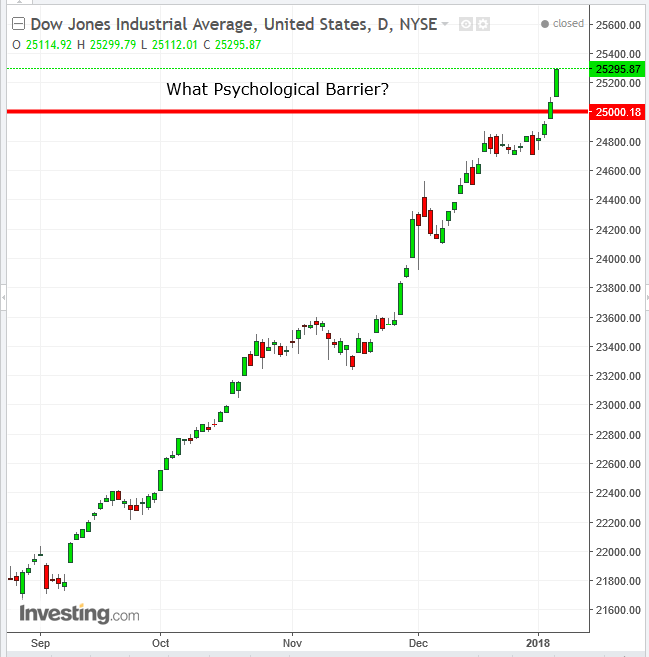
The Dow Jones Industrial Average effortlessly powered past the 25,000 level. Out of 4 trading days, the 30 component index of US mega caps posted three records, each with a rising gap as well. And like the SPX, the Dow's weekly price closed at the highest point of the week.
The NASDAQ Composite, last week's strongest US equity index performer, leaped 3.4 percent, it’s biggest weekly jump since early November 2016. Out of 4 trading days, it also posted four records, each on a rising gap.
The Russell 2000 'underperformed,' rising only 1.6 percent. It had a single, filled gap on Thursday and overall weakness, as bears repeatedly pushed back.
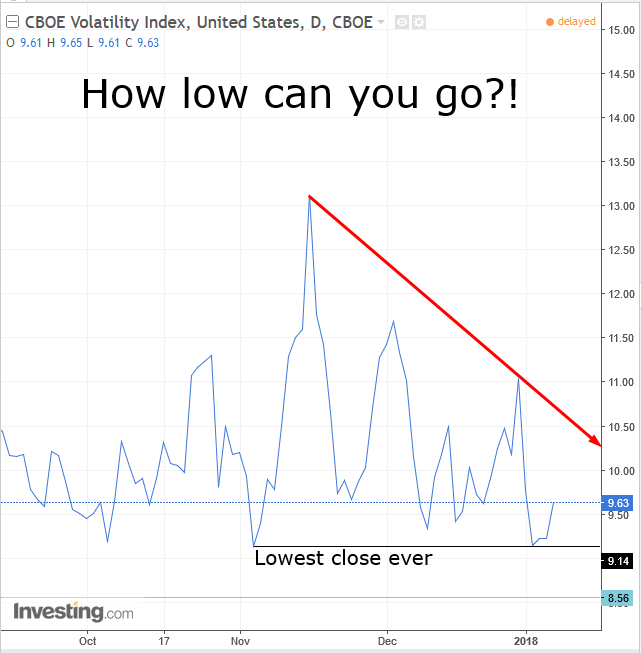
Of interest, the VIX closed Wednesday with a reading of 9.15, a single point above the volatility index's all-time low of 9.14, registered on November 3. While some analysts may view this sign of complacency as the quiet before the storm, Ralph Acampora, the godfather of technical analysis, considers this indicator an exceptionally strong signal of strength from the buy side of the market.
Internally, the S&P's Materials sector led last week, up 3.85 percent, followed closely by Technology which gained 3.67 percent. Utilities saw the biggest losses, down 2.56 percent, followed by Real Estate, down 2.03 percent, the only two sectors in the red.
Global Financial Affairs
This morning Asian equities climbed higher to start the week, on optimism that the region’s earnings season, which begins this week, will follow last year's performance. The exceptionally bullish sentiment overall, visible via last week’s power-rally, is undoubtedly affecting the hopeful outlook of an earnings season that could justify and support ongoing record equity highs.
South Korea's won dropped more than half a percent after its government warned it will take steps “sternly” should the currency continue to climb, after it was Asia’s best performing currency last year, gaining 13 percent on the year. It's currently trading at the very bottom of the session.
Thriving South Korean exports and rising interest rates, the first time since 2011, buoyed the currency during a time when investors were hungry for emerging market assets, buying all they could, since developed market stocks were trading at record highs. In addition, a resumption of talks between North and South Korea has given the won another boost.
The weakening currency may have boosted the KOSPI, which jumped 0.65 percent, more than any other major Asian index. Markets in Tokyo were closed for the Adults' Day holiday.
The Stoxx Europe 600 Index joined Asian equities and rallied, extending its advance, after posting its best week since April last week.
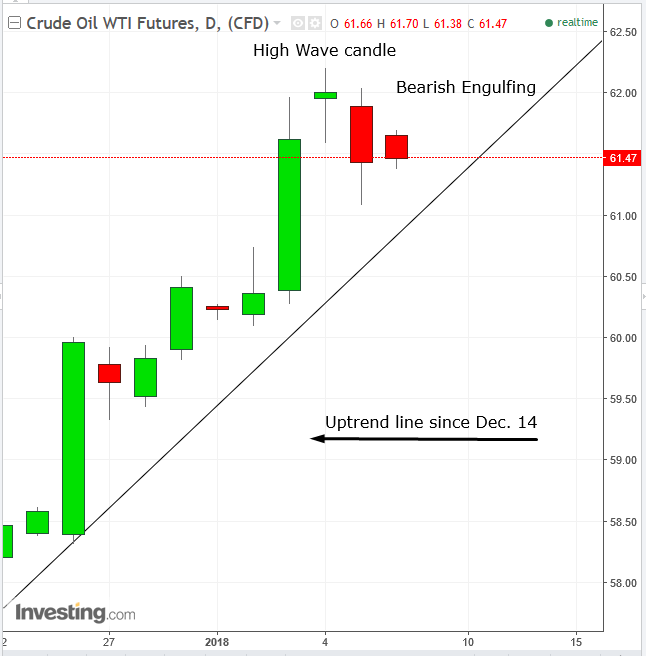
WTI crude oil is trading above $61, on signs of a slow-down in US drilling, adding to optimism that the global crude glut is finally balancing out. The number of working rigs fell by five during the seven days ending January 5, for a total of 742 according to Baker Hughes data reported last Friday.
However, while prices remain above $61, they have been slipping from their $61.66 open and are trading near their session lows. When the positive Baker Hughes information was released on Friday, WTI still closed 0.9 percent lower, ending a 3 day advance for the biggest retreat since December 13. Hedge funds scaled back their 10-month long bullish stance on oil during the week ending January 2.
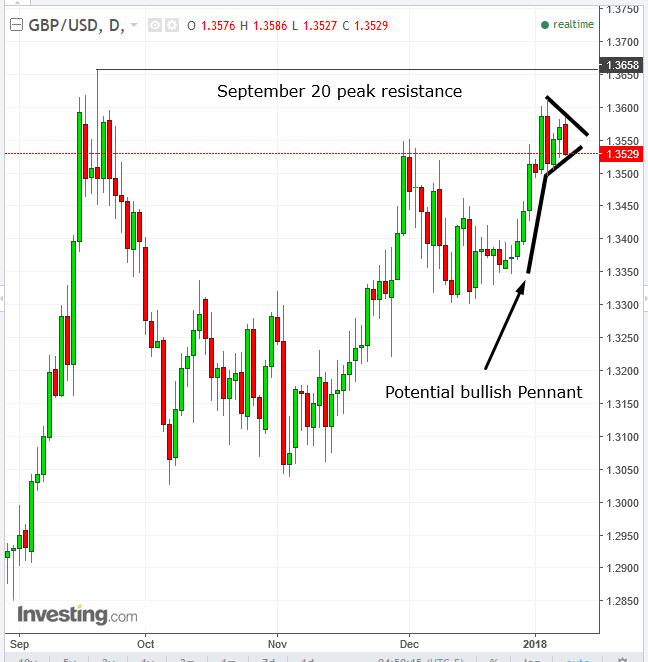
The pound remains in focus as UK Prime Minister Theresa May is set to reshuffle her cabinet today. The effort could continue into Tuesday. It follows the firing of Damian Green last month as first secretary of state.
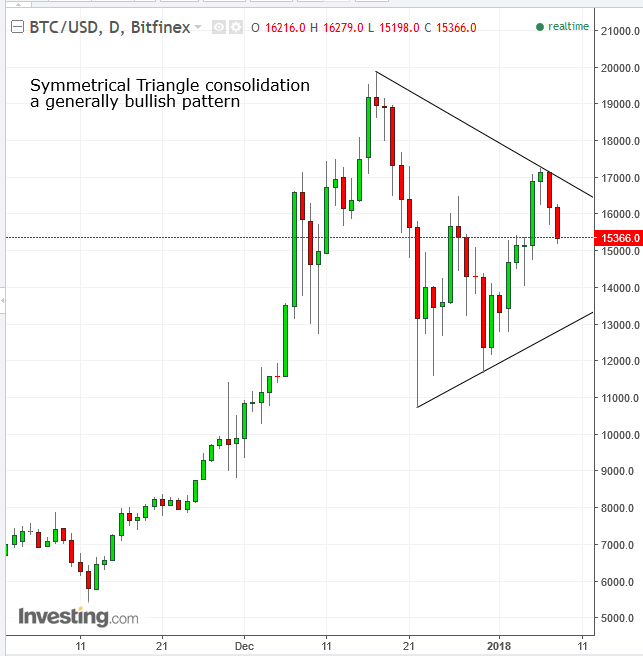
Bitcoin's slump continues. The cryptocurrency completed a Bearish Engulfing Pattern on Sunday, which confirmed a bearish Hanging Man on Friday. Today, it extended its decline, returning to the $15,000 key level.
Yesterday, The Wall Street Journal published an article positing that individual investors are more likely to hold bullish bets on Bitcoin, whereas larger players tended to short the digital currency. We've argued similarly, and just yesterday pointed out that since mid-2016, there were many ways in which the little guy was able to beat the political consensus including Brexit and the Trump presidency; However, we wonder if Bitcoin and its sister cryptocurrencies will enable the little guy to beat the financial system?
Up Ahead
- US inflation data will probably show price pressures remain muted, giving hawks little reason to argue for faster tightening.
- San Francisco Fed President John Williams and New York Fed President Bill Dudley are among policy makers scheduled to speak this week. Consensus expects little change in Fed and other major Central Bank policy in 2018.
- North Korea and South Korea are slated to hold talks Tuesday for the first time since 2015.
- China producer and consumer prices data are due Wednesday, while a reading on the country’s money supply is expected in the coming days.
- Earnings season begins this week in the US, starting with financial institutions include JPMorgan Chase (NYSE:JPM), Wells Fargo (NYSE:WFC) and BlackRock (NYSE:BLK).
Market Moves
Stocks
- Hong Kong’s Hang Seng advanced 0.2 percent, the 10th straight day of gains, while the mainland Shanghai Composite Index outperformed, jumping 0.50 percent.
- Australia’s S&P/ASX 200 Index couldn’t hold on to 0.33 percent gains, paring down to 13 percent, forming a bearish shooting star.
- Indices in India, Taiwan, Singapore and Malaysia also advanced.
- The U.K.’s FTSE 100 declined 0.1 percent as of 8:24 London time (3:24 EST).
- The MSCI All-Country World Equity Index was little changed, while the MSCI Emerging Markets Index jumped 0.3 percent, hitting the highest in almost seven years on its fifth consecutive advance.
- The Stoxx Europe 600 Index advanced 0.2 percent to 397.35, the highest in more than two years.
- S&P 500 Futures were steady.
Currencies
- The euro dipped 0.2 percent to $1.1999, the weakest in more than a week.
- The Dollar Index jumped 0.53 percent to 92.26, its largest climb since December 15.
- The British pound decreased 0.2 percent to $1.3538.
Bonds
- The yield on 10-year Treasuries increased less than one basis point to 2.48 percent, the highest in two weeks.
- Germany’s 10-year yield increased one basis point to 0.45 percent.
Commodities
